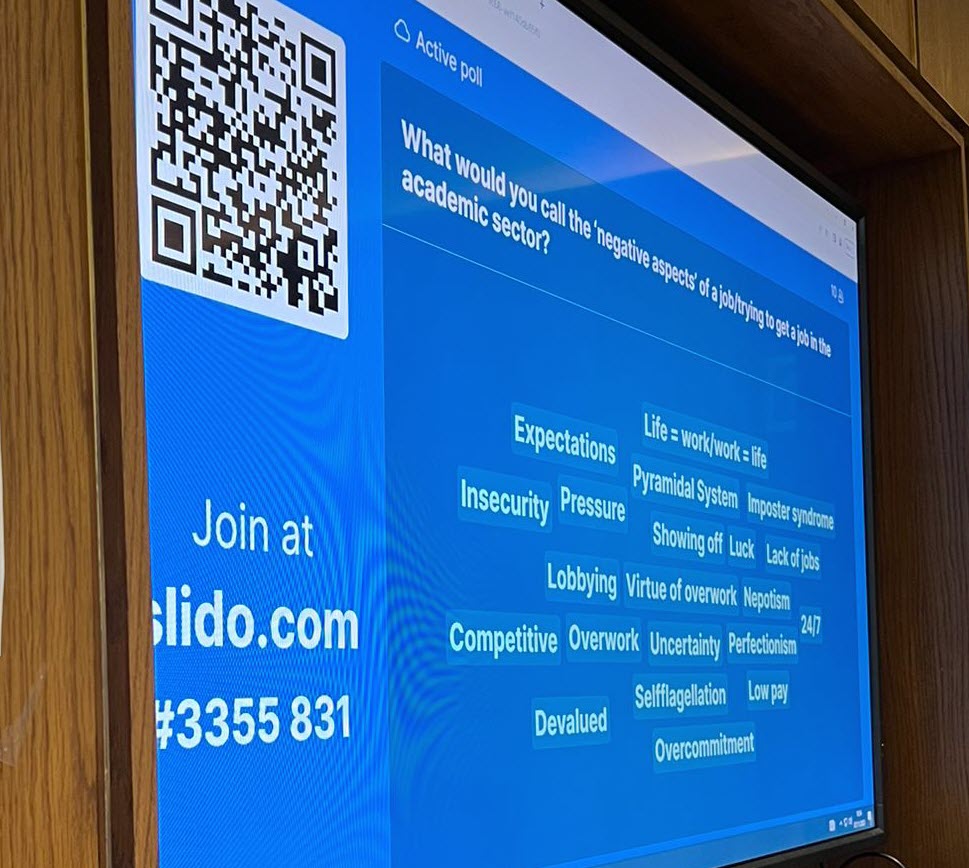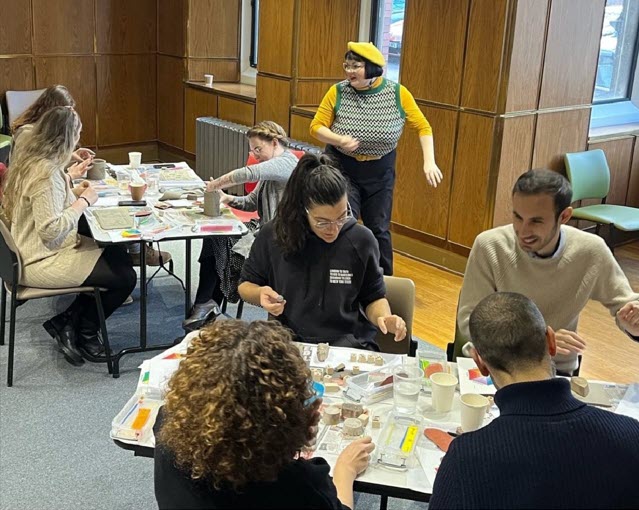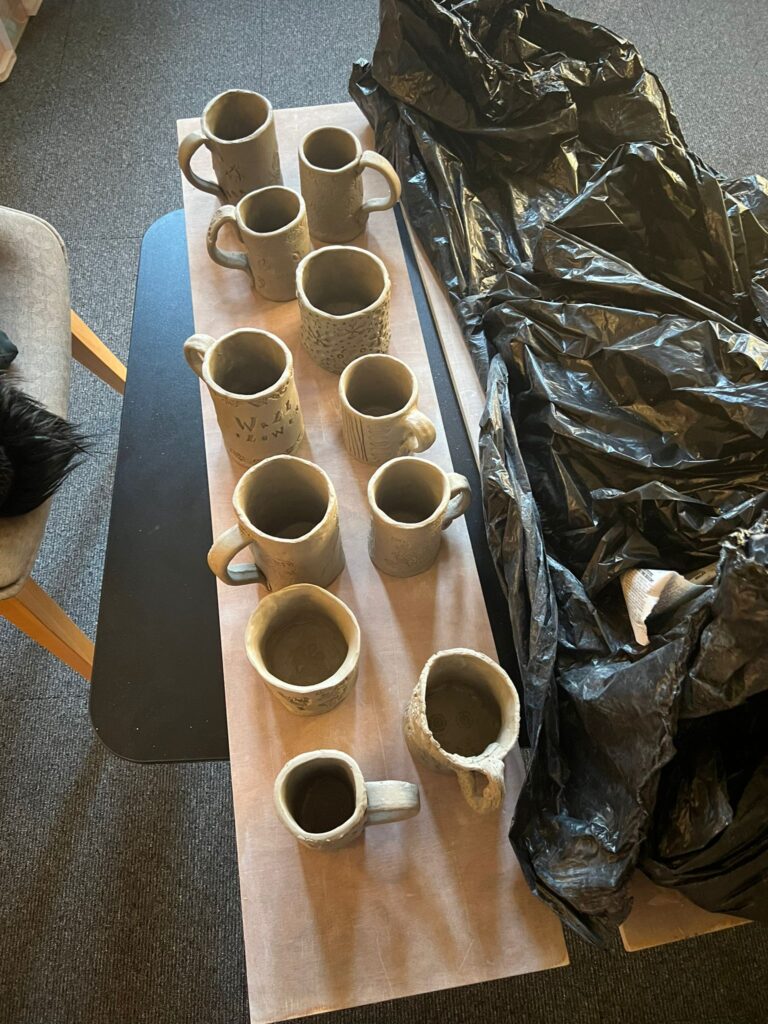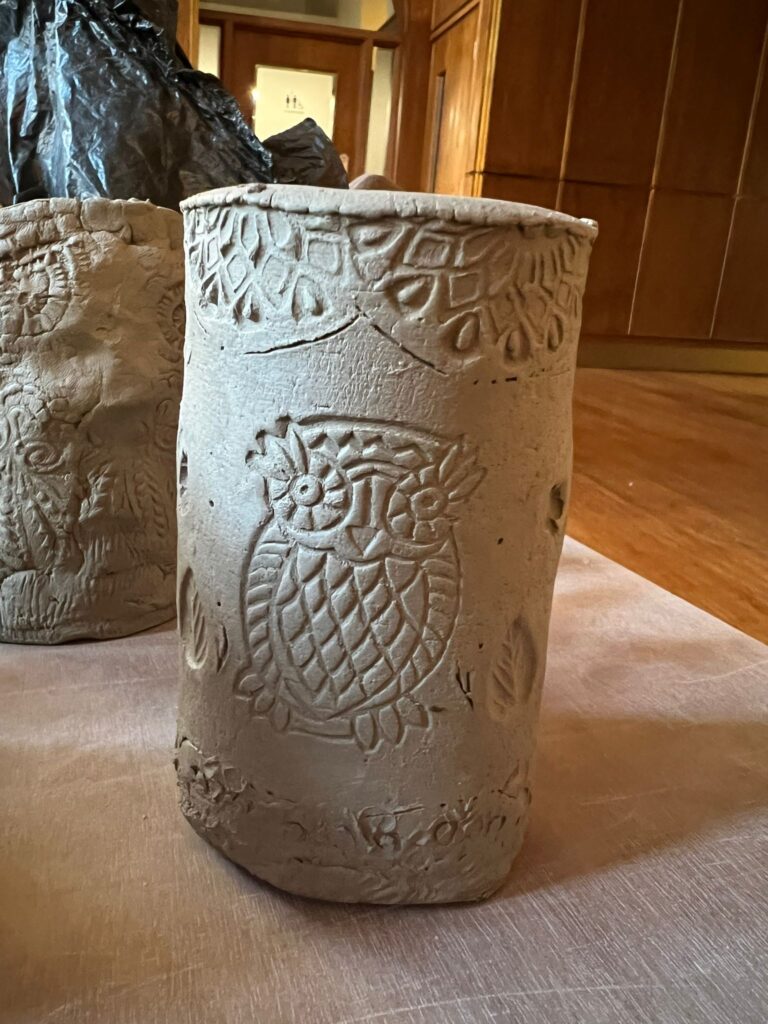Jerome Ruddick, PGR
School of History, Classics and Archaeology
Faculty of Humanities and Social Sciences
What did you do?
A colleague and I designed a wellbeing workshop to tackle mental health issues within academia. As part of this, we carried out a pottery making activity. This was intended to help PGR students disassociate from their own thoughts, engage with their peers, and practice self-evaluation. The ultimate aim was, through this activity, to help PGR students to relax, and thus feel free to discuss personal issues and respond with honesty to a set of questions given to them about mental wellbeing within academia. This activity was also intended to help promote collaborative discussion, as the PGR students were grouped in fours around small tables.
Mugs created in the workshop
Who is involved?
Myself and my colleague, Elly Polignano.
How did you do it?
The pottery making activity was chosen because it had outside evidence of success. One of the supporters of the conference, Dr Laura Leonardo, had undertaken the activity in the course of wellbeing and experienced positive feelings of distraction and disassociation as a result of it.
We hired a local company, Muddy Fingers, to run their basic course (making a mug). We obtained funding to do so (c. £400). They provided all the equipment and transport for it – we used a reception room in ARMB to host the activity. We split the PGR students, around 14, into groups of four around a set of tables. Each were given the tools needed to make the pottery and were provided with instructions by the potters. We allowed them twenty minutes or so to bed in, and then we began to run them through some mental activities. These were low-stake, basic questions: e.g., have you ever experienced a set-back in your academic career? We, the teachers, primed this activity by openly discussing our own failures and rejections, to ensure the environment was open and inclusive. The questions were put up on the whiteboard, so they could refer back to them at any time.

A word cloud from a workshop poll
We allowed the students 20 minutes to discuss each question – we were unconcerned if they stopped talking to focus on their pottery. The point was to ensure they had the chance to be open and receptive. We obtained their written permission to use, anonymously, any remarks they made during the session.
Why did you do it?
Mental health is a key issue in academia, and though certain taboos around it have begun to subside, there are still issues present. Mainly, many are self-conscious about admitting to failure within an environment where success is highly praised and the lack of it can be seen to affect your reputation.
The workshop in general was conducted to help tackle this perception. Failure happens and talking about it is healthy. The pottery activity provided enjoyment, and it allowed the PGR students to step outside their comfort zones. In a sense, it was a levelling tool. Moreover, the chance to distract them, and thus allow them to feel less self-conscious, was also important for obtaining honest, in-depth, answers to the questions.
Does it work?
The PGR students overwhelmingly enjoyed the pottery-making session, finding it a refreshing and therapeutic break from the usual demands of academia and research. Many appreciated that the activity required no prior experience, allowing everyone to engage on equal footing without the pressure of expertise. The hands-on, creative process was calming, satisfying, and provided a welcome mental and physical respite. Additionally, some noted the communal aspect of the activity, which fostered a relaxed, social environment and contributed to a sense of wellbeing. The day’s other activities, such as discussions and meditation, were also well-received, but the pottery stood out as particularly impactful.

Workshop participants creating their mugs
Ultimately, we found a much higher level of discussion during the activity. Questions amongst themselves about how to do something, or what design worked for their mug, usually led to them engaging with the wellbeing questions with a greater level of depth than we had expected. Many of the details shared were personal, and clearly outlined what wellbeing issues they had faced, where these stemmed from, and what appropriate ways forward in relation to them would be.
Additionally, PGR students offered several suggestions to enhance future mental health and wellbeing sessions in academia. They recommended expanding the sessions to include not just postgraduate researchers but also academics at higher levels, to address systemic issues and encourage positive role modelling. Extending the duration to two days and incorporating social activities were proposed to foster deeper engagement. Providing a choice of activities, including scientific references on mindfulness, and organizing regular communal gatherings were also suggested to reinforce the session’s impact. Additionally, PGR students emphasized the importance of steering discussions toward practical solutions and tips for overcoming challenges in academia, ensuring the sessions remain proactive and solution focused.
The Graduate Framework
This case study demonstrates the following attributes:
- Future Focused
- Resilient
- Curious
- Collaborative
- Engaged


